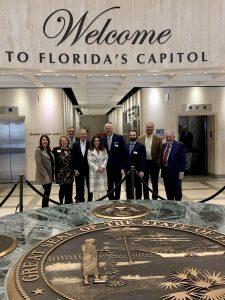Over the past two weeks I’ve had the opportunity to walk the halls of our two Capitols. First, I took six of our teen leaders to Washington, DC with our Reform movement’s L’taken Teen Social Justice Seminar; a weekend trip where teens from around the nation gather for learning, sightseeing, and culminate with visiting our senators’ and representatives’ offices on Capitol Hill. Each teen was invited to share their thoughts about an issue of their choosing and voice their opinion to our nation’s government. It was inspiring to hear the leaders of the next generation passionately and articulately express their vision for a better world, inspired by the teachings of our Jewish tradition.
A week after returning from Washington I was on my way to Tallahassee, part of a delegation from Ruth and Norman Rales Jewish Family Services and their partner agencies in Miami-Dade, Broward, and northern Palm Beach Counties, to ask the State Legislature for funding for mental health, trauma response, and senior home care services. By coming together as a multi-agency community, we have had success in the past in securing that much needed funding, and our hopes that that success will continue again.

I have been fascinated with government since I was little. I’ve always loved visiting Washington. I studied political science and philosophy in college, and had at times imagined myself working in that field. Not surprisingly, I relish the opportunities as a rabbi to interact with our elected officials, working together to envision a better community for all. But my visits to our national and state legislatures over these past two weeks had particular resonance with me as I thought about the events in this week’s Torah portion, Yitro. Yitro famously records our people’s great legislative moment, as the Holy One reveals the Ten Commandments to our people at Mount Sinai.
One of my favorite midrashim, rabbinic commentaries on the Torah, is based on the opening of the Ten Commandments, “I am the Eternal your God, who led you out of the land of Egypt, the house of bondage.” The rabbis, knowing that the giving of the Ten Commandments is in some ways the foundational moment of our coming together as a people in relationship with God, wondered why the Torah didn’t begin there. Just like our Constitutions have preambles that set the overarching vision for what is to follow, the Ten Commandments works in a similar fashion. Why not begin there?
The answer, the rabbis teach, lies in a parable of a king of flesh and blood who rides into town one day and says to the residents, “I am now your king; you shall do as I say.” The people of the town, not surprisingly, responded with, “And who are you to tell us what to do?” In that vein, God recognized that giving the Jewish people the Ten Commandments without first building a relationship with us may not have been well-received. As it is, just after this great moment of revelation our ancestors starting complaining about the heat and lack of water, building a golden calf, and in general questioning our relationship! But by first guiding us through the stories of Genesis and then our redemption from Pharaoh, the Torah can tell us that the God who is giving us the Ten Commandments was that God who freed us from bondage.
We learn from this story that a lawgiver, a legislator, relies on relationships with the governed in order to be most effective. The Holy One as a legislator knew that, and all the more so for our elected officials in Tallahassee and Washington. As exciting as it was to walk the halls of power, that power that the legislatures carry only exists because they have and continued to build and maintain a relationship with us, the governed. As our teens and the Jewish social service agencies went to the Capitols to make an ask, in each meeting we were thanked for having done so, for making ourselves known, for being present.
During our three days together in Tallahassee, Rales JFS CEO Danielle Hartman and I were reflecting on the fact that she would be speaking at services this evening, further reinforcing our congregation’s relationship with JFS. She will be sharing a bit about Jewish Disability Awareness Month, and reminding us of the many services that JFS offers to our community. When we work together, as she and I did this week, everyone across the community benefits. When we as members of a community share our voice and speak to those in power, on behalf of ourselves and those who do not have a voice or the ability to do so, we can spread those benefits farther and wider.
So, this Shabbat, let us pray that our collective voices for good, inspired by our tradition, can bring that goodness into the world.
Shabbat Shalom,

Rabbi Greg Weisman
Join us for tonight’s Shabbat service at Temple Beth El’s Schaefer Family Campus or online on Virtual Beth El.








